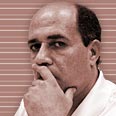
Forget Paris
PM Olmert takes backseat as Syria’s Assad steals show at Paris summit
Sarkozy’s summit appeared too ambitious to begin with; the opposition said it was megalomaniac. Newspaper Le Parisien titled the event: “Sarkozy’s gamble.” Following the Annapolis Conference, and with the United States not in the picture, what can a French president who is not appreciated in his own country do for the sake of the bleeding Middle East? Well, as it turns out, there is life after Annapolis and after George W. Bush. The Paris summit proved it. We have the European Union, with France serving as the current president and leading a move that aims to secure world peace by starting in the Middle East.
The summit brought together leaders of more than 40 countries, with the declared objective being a boost to ties between Europe and the Mideast in order to stimulate joint ventures. However, the practical objective was different – letting the rebellious Assad through the front door in a bid to turn him from a declared Iranian subject to a distinguished member of the moderate camp. Assad was the objective; all the rest, including Israel and Olmert, were the backdrop.
No handshakes, for now
More than 2,000 journalists from around the world arrived in Paris. They rushed around like poisoned rats every time a Syrian was seen moving somewhere. The excitement reached unbearable levels when Syrian Foreign Minister Walid al-Muallem rushed to one of the conference rooms. “Would you like to talk to us?” we asked him. The Syrian lifted his chin in the face of our nametag, which indicated that we’re Israeli, and blatantly ignored us. For the time being there is no dialogue between Syria and the Israeli media.
When Olmert entered the conference room he sat on one side of a giant round table, with Assad sitting on the other end, far away. Dan Williams from Reuters claims that his photographer shot Olmert shaking the hands of the leaders around him while Assad turns his back and looks away, ignoring the Israeli PM. However, Olmert’s entourage denied this vehemently. Yet there is no arguing that a short while before it was Olmert’s turn to speak, Assad left the room.
A senior diplomatic official at the Israeli delegation explained to us that the message was not meant for Israel, but rather, for the Arab world, for Iran, and for the Syrian people.
Another Israeli diplomat who is closely familiar with Syria explained that Assad made a major move by merely arriving in Paris and sitting under the same roof and around the same table as Israel’s leader. “A gesture to Olmert, such as shaking his hand or even sitting there while an Israeli delivers a speech, is too much for him. As it is, he is scared to be drawn to the West more quickly than he wishes to. He is facing great pressures, particularly from Iran’s direction,” the diplomat explained.
Everyone’s interested in Assad
One way or another, Assad was the one to draw most attention in Paris. Not only the media wanted to see what has changed about the man nicknamed “the dictator from Damascus.” Everyone wanted to see what’s going on with the leader who is still committed to Iran’s interests, is accused by the US of assisting Iraqi insurgents, and is designated by Israel and the West as a terror sponsor who hosts terror headquarters in Damascus and smuggles weapons to Hizbullah.
The Western leaders who shook his hand, those who promoted the intra-Lebanese political moves, and those who back the indirect talks with Israel via Turkey wanted to find out who they are dealing with, and whether the new star can detach himself from the axis of evil.
While I wrote these lines, French soldiers were marching through the streets of the French capital. Olmert watched the parade and dejectedly observed the new star who stole the show in Paris. On the one hand, he should be lauding this, because the West opening up to Assad is vital for Israel’s interests as well, as this is the way to curb the axis of evil. After all, Olmert too is talking to Assad, indirectly.
Yet still, it isn’t pleasant to serve as the backdrop for an event where at the end of the day, your presence is cast aside in favor of someone else.










